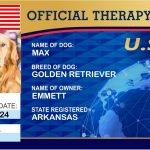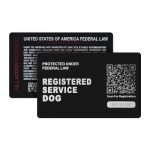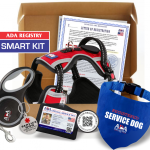Pet Policies vs. Companion Animals
April 26, 2020
HUD has issued new rules clarifying the responsibilities landlords shoulder regarding companion animals in rental properties.
The newly released a “Notice on Service Animals and Assistance Animals for People with Disabilities in Housing and HUD-Funded Programs discusses how the Fair Housing Act and the Americans with Disabilities Act (ADA) intersect regarding the use of service or assistance animals by persons with disabilities.
The Fair Housing Act prohibits landlords from discriminating based on disability, race, color, national origin, religion, sex, and familial status. The ADA prohibits discrimination against people with disabilities in employment, transportation, public accommodations, communications, and state and local government activities.
Both laws contain provisions which address the use of service or assistance animals by people with disabilities. While the Fair Housing Act covers nearly all types of housing, some types of housing, such as public housing, are covered by both laws.
HUD Assistant Secretary for Fair Housing and Equal Opportunity, says a “Disability-related complaints, including those that involve assistance animals, are the most common discrimination complaint we receive.”
HUD„¢s new notice explains housing providers obligations under the Fair Housing Act, including the requirement to provide reasonable accommodations to people with disabilities who require assistance animals. Pet restrictions cannot be used to deny or limit housing to people with disabilities who require the use of an assistance animal because of their disability. Housing providers must grant reasonable accommodations in such instances, in accordance with the law.
According to the notice, two threshold questions must be addressed when a tenant asks for a companion animal:
1. Does the person seeking to use and live with the animal have a disability ” i.e., a physical or mental impairment that substantially limits one or more major life activities?
2. Does the person making the request have a disability-related need for an assistance animal? In other words, does the animal work, provide assistance, perform tasks or services for the benefit of a person with a disability, or provide emotional support that alleviates one or more of the identified symptoms or effects of a person’s existing disability?
If the answer to question (1) or (2) is “no,” then the law does not require a modification of an existing “no pets” policy, and the reasonable accommodation request may be denied.
However, if the answer to these questions is “yes”, the landlord must modify or provide an exception to a “no pets” policy to permit a person with a disability to live with and use an assistance animal(s) in all areas of the premises where persons are normally allowed to go, unless doing so would impose an undue financial and administrative burden or would fundamentally alter the nature of the housing provider’s services.
A request for companion animal also may be denied if: (1) the specific assistance animal in question poses a direct threat to the health or safety of others that cannot be reduced or eliminated by another reasonable accommodation, or (2) the specific assistance animal in question would cause substantial physical damage to the property of others that cannot be reduced or eliminated by another reasonable accommodation. Breed, size, and weight limitations may not be applied to an assistance animal.
A determination that an assistance animal poses a direct threat of harm to others or would cause substantial physical damage to the property of others must be based on an individualized assessment that relies on objective evidence about the specific animal’s actual conduct ” not on mere speculation or fear about the types of harm or damage an animal may cause and not on evidence about harm or damage that other animals have caused. Conditions and restrictions that housing providers apply to pets may not be applied to assistance animals. For example, while housing providers may require applicants or residents to pay a pet deposit, those rules cannot be applied to companion animals.
Landlord cannot deny a reasonable accommodation request because they’re not certain whether the person seeking the accommodation has a disability or a disability-related need for an assistance animal. Housing providers may ask individuals who have disabilities that are not readily apparent or known to the provider to submit reliable documentation of a disability and their disability-related need for an assistance animal.
If the disability is readily apparent or known but the disability-related need for the assistance animal is not, the housing provider may ask the individual to provide documentation of the disability-related need for an assistance animal. For example, the housing provider may ask persons who are seeking a reasonable accommodation for an assistance animal to provides emotional support to provide documentation from a physician, psychiatrist, social worker, or other mental health professional that the animal provides emotional support that alleviates one or more of the identified symptoms or effects of an existing disability. Such documentation is sufficient if it establishes that an individual has a disability and that the animal in question will provide some type of disability-related assistance or emotional support.
However, a landlord may not ask a tenant or applicant to provide documentation showing the disability or disability-related need for an assistance animal if the disability or disability-related need is readily apparent or already known to the provider.
A housing provider also may not ask an applicant or tenant to provide access to medical records or medical providers or provide detailed or extensive information or documentation of a person’s physical or mental impairments.
While HUD makes it clear that private landlords have a legal duty under the Fair Housing Act to accept any qualifying companion animal into a rental property, the Department of Justice has narrowed its definition of service animals allowed into government and educational facilities under the ADA, to “any dog that is individually trained to do work or perform tasks for the benefit of an individual with a disability, including a physical, sensory, psychiatric, intellectual, or other mental disability. Emotional support animals are expressly precluded.
For more information, current forms or help regarding your Service Dog or ESA, please visit: www.tsdag.com
Check Out Our Store

















